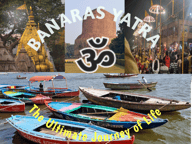Buddhism
Introduction
Buddhism also known as Buddha Dharma, philosophical tradition based on teachings attributed to the Buddha, a wandering teacher who lived in the 6th or 5th century BCE. It is the world's fourth-largest religion, with over 520 million followers, known as Buddhists, who comprise seven percent of the global population. It arose in the eastern Gangetic plain in the 5th century BCE, and gradually spread throughout much of Asia. Buddhism has subsequently played a major role in Asian culture and spirituality, eventually spreading to the West in the 20th century.
According to tradition, the Buddha instructed his followers in a path of development which leads to awakening and full liberation from dukkha (lit. 'suffering or unease). He regarded this path as a Middle Way between extremes such as asceticism or sensual indulgence. Teaching that dukkha arises alongside attachment or clinging, the Buddha advised meditation practices and ethical precepts rooted in non-harming. Widely observed teachings include the Four Noble Truths, the Noble Eightfold Path, and the doctrines of dependent origination, karma, and the three marks of existence. Other commonly observed elements include the Triple Gem, the taking of monastic vows, and the cultivation of perfections (pāramitā).
The Buddhist canon is vast, with many different textual collections in different languages (such as Sanskrit, Pali, Tibetan, and Chinese). Buddhist schools vary in their interpretation of the paths to liberation (mārga) as well as the relative importance and "canonicity" assigned to various Buddhist texts, and their specific teachings and practices. Two major extant branches of Buddhism are generally recognized by scholars: Theravāda (lit. 'School of the Elders') and Mahāyāna (lit. 'Great Vehicle'). The Theravada tradition emphasizes the attainment of nirvāṇa (lit. 'extinguishing') as a means of transcending the individual self and ending the cycle of death and rebirth (saṃsāra), while the Mahayana tradition emphasizes the Bodhisattva ideal, in which one works for the liberation of all sentient beings. Additionally, Vajrayāna (lit. 'Indestructible Vehicle'), a body of teachings incorporating esoteric tantric techniques, may be viewed as a separate branch or tradition within Mahāyāna.
The Theravāda branch has a widespread following in Sri Lanka as well as in Southeast Asia, namely Myanmar, Thailand, Laos, and Cambodia. The Mahāyāna branch—which includes the East Asian traditions of Tiantai, Chan, Pure Land, Zen, Nichiren, and Tendai is predominantly practised in Nepal, Bhutan, China, Malaysia, Vietnam, Taiwan, Korea, and Japan. Tibetan Buddhism, a form of Vajrayāna, is practiced in the Himalayan states as well as in Mongolia and Russian Kalmykia. Japanese Shingon also preserves the Vajrayana tradition as transmitted to China. Historically, until the early 2nd millennium, Buddhism was widely practiced in the Indian subcontinent before declining there; it also had a foothold to some extent elsewhere in Asia, namely Afghanistan, Turkmenistan, Uzbekistan, and Tajikistan.
Tour Itinerary
Day 1 : Arrive Delhi : On arrival at the airport our representative will receive you from the airport and check in the hotel.
Day 2 : Delhi : After breakfast proceed for the guided tour of delhi visit REd Fort (Lal Quila) Qutub minar, Humayun tomb, Jama masjid, akshar dhaam temple etc. after having the lunch on the way we also visit the old part of delhi like chandani chawk etc. Over night stay at the hotel.
Day 3 : Delhi / Varanasi: After breakfast proceed to airport for Varanasi.
Day 4 : Varanasi : On arrival our representative will receive you and bring you to the hotel after check in and refreshmet you will enjoy the guided tour of the evening Ganga Aarti at the river back to hotel and over night stay in the hotel.
Day 5 : Varanasi : Wake up Early in the morning and proceed for boat ride on the river Ganga after then back to hotel, after breakfast and refreshment proceed for a guided tour of Sarnath "a place where lord Buddha deliverd his firt sermon to hi five disaple.
Day 6 : Varanasi /Bodhgaya : After breakfast proceed to bodhgaya by car/ bus/ rail or flight check in the hotel.
Day 7 : Bodhgaya / Patna: After breakfast check out from the hotel proceed for guided tour of Bodhgaya here lord Buddha attain the "enlightment" after lunch on the way you will proceed for next journey.
Day 8 : Patna : On arrival at Patna check in the hotel & after refreshment sightseeing of Patna. overnight stay in the hotel.
Day 9 Pata / Kushinagar : After breakfast proceed to Kushinagar check in the hotel & after refreshment sightseeing of Kushinagar. Over night stay in the hotel.
Day 10 : Kushinagar / Lumbini: After breakfast checkout from the hotel & proceed for lumbini over night stay in the hotel.
Day 11 : Lumbini / Balrampur: After breakfast check out from the hotel & visit the lumbini " The birth place of Buddha" after having the lunch on the way proceed for Balrampur check in the hotel after refreshment sightseeing of Balrampur back to hotel & over night stay.
Day 12 : Balrampur / Lucknow / Delhi : After breakfast check out & proceed to Lucknow or Delhi.
Package Cost : Rs. 139999.00 for 2 people or US $ 1800 for 2 people((include: Hotel with CPAI basis, Assistance/Tour guide, Taxi, Boat, parking, etc.
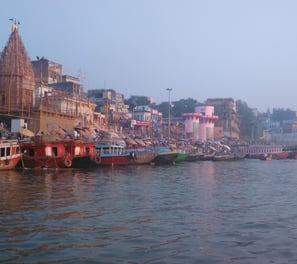

Varanasi
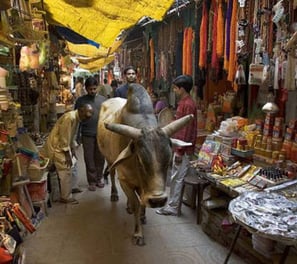

Varanasi
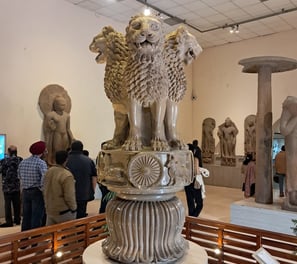

Sarnath
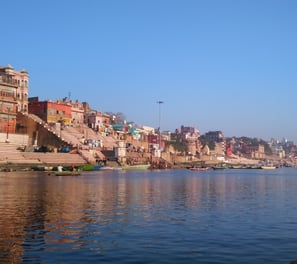

Varanasi
